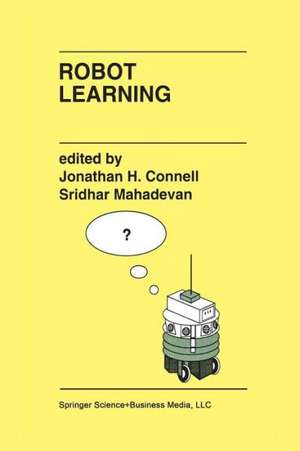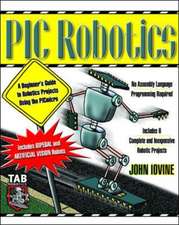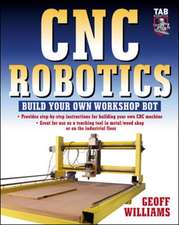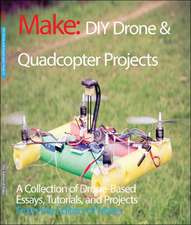Robot Learning: The Springer International Series in Engineering and Computer Science, cartea 233
Editat de J. H. Connell, Sridhar Mahadevanen Limba Engleză Paperback – 27 sep 2012
Although its roots can be traced back to the late fifties, the area of robot learning has lately seen a resurgence of interest. The flurry of interest in robot learning has partly been fueled by exciting new work in the areas of reinforcement earning, behavior-based architectures, genetic algorithms, neural networks and the study of artificial life. Robot Learning gives an overview of some of the current research projects in robot learning being carried out at leading universities and research laboratories in the United States. The main research directions in robot learning covered in this book include: reinforcement learning, behavior-based architectures, neural networks, map learning, action models, navigation and guided exploration.
| Toate formatele și edițiile | Preț | Express |
|---|---|---|
| Paperback (1) | 942.63 lei 6-8 săpt. | |
| Springer Us – 27 sep 2012 | 942.63 lei 6-8 săpt. | |
| Hardback (1) | 948.79 lei 6-8 săpt. | |
| Springer Us – 30 iun 1993 | 948.79 lei 6-8 săpt. |
Din seria The Springer International Series in Engineering and Computer Science
- 24%
 Preț: 1041.97 lei
Preț: 1041.97 lei - 20%
 Preț: 643.50 lei
Preț: 643.50 lei - 18%
 Preț: 1225.62 lei
Preț: 1225.62 lei - 18%
 Preț: 965.02 lei
Preț: 965.02 lei - 20%
 Preț: 646.12 lei
Preț: 646.12 lei - 18%
 Preț: 948.79 lei
Preț: 948.79 lei - 20%
 Preț: 646.62 lei
Preț: 646.62 lei - 15%
 Preț: 637.46 lei
Preț: 637.46 lei - 20%
 Preț: 643.83 lei
Preț: 643.83 lei - 18%
 Preț: 949.23 lei
Preț: 949.23 lei - 20%
 Preț: 644.48 lei
Preț: 644.48 lei - 20%
 Preț: 994.92 lei
Preț: 994.92 lei - 20%
 Preț: 645.97 lei
Preț: 645.97 lei - 18%
 Preț: 946.87 lei
Preț: 946.87 lei - 20%
 Preț: 995.57 lei
Preț: 995.57 lei - 18%
 Preț: 956.99 lei
Preț: 956.99 lei - 20%
 Preț: 644.98 lei
Preț: 644.98 lei - 15%
 Preț: 649.54 lei
Preț: 649.54 lei - 18%
 Preț: 950.21 lei
Preț: 950.21 lei - 18%
 Preț: 1221.38 lei
Preț: 1221.38 lei - 18%
 Preț: 957.62 lei
Preț: 957.62 lei - 15%
 Preț: 643.99 lei
Preț: 643.99 lei - 18%
 Preț: 948.47 lei
Preț: 948.47 lei - 18%
 Preț: 947.35 lei
Preț: 947.35 lei - 20%
 Preț: 1284.65 lei
Preț: 1284.65 lei - 20%
 Preț: 1633.95 lei
Preț: 1633.95 lei - 20%
 Preț: 1285.78 lei
Preț: 1285.78 lei
Preț: 942.63 lei
Preț vechi: 1149.54 lei
-18% Nou
Puncte Express: 1414
Preț estimativ în valută:
180.41€ • 187.62$ • 150.97£
180.41€ • 187.62$ • 150.97£
Carte tipărită la comandă
Livrare economică 15-29 martie
Preluare comenzi: 021 569.72.76
Specificații
ISBN-13: 9781461363965
ISBN-10: 1461363969
Pagini: 256
Ilustrații: XIII, 240 p.
Dimensiuni: 155 x 235 x 13 mm
Greutate: 0.36 kg
Ediția:Softcover reprint of the original 1st ed. 1993
Editura: Springer Us
Colecția Springer
Seria The Springer International Series in Engineering and Computer Science
Locul publicării:New York, NY, United States
ISBN-10: 1461363969
Pagini: 256
Ilustrații: XIII, 240 p.
Dimensiuni: 155 x 235 x 13 mm
Greutate: 0.36 kg
Ediția:Softcover reprint of the original 1st ed. 1993
Editura: Springer Us
Colecția Springer
Seria The Springer International Series in Engineering and Computer Science
Locul publicării:New York, NY, United States
Public țintă
ResearchCuprins
1 Introduction to Robot Learning.- 1 Motivation.- 2 The Robot Learning Problem.- 3 Background.- 4 Domains.- 5 Roadmap.- 2 Knowledge-based Training of Artificial Neural Networks for Autonomous Robot Driving.- 1 Introduction.- 2 Network Architecture.- 3 Network Training.- 4 Performance Improvement Using Transformations.- 5 Results and Comparison.- 6 Discussion.- 3 Learning Multiple Goal Behavior via Task Decomposition and Dynamic Policy Merging.- 1 Introduction.- 2 Basics of Reinforcement Learning.- 3 Multiple Goal Tasks.- 4 A Decomposition Approach.- 5 Search-based Merging.- 6 A Hybrid Architecture.- 7 Summary.- 4 Memory-based Reinforcement Learning:Converging with Less Data and Less Real Time.- 1 Introduction.- 2 Prioritized Sweeping.- 3 A Markov Prediction Experiment.- 4 Learning Control of Markov Decision Tasks.- 5 Experimental Results.- 6 Discussion.- 7 Conclusion.- 5 Rapid Task Learning for Real Robots.- 1 Introduction.- 2 Behavior-based Reinforcement Learning.- 3 Exploiting Local Spatial Structure.- 4 Using Action Models.- 5 Highly Structured Learning.- 6 Summary.- 6 The Semantic Hierarchy in Robot Learning.- 1 Introduction.- 2 The Cognitive Map and the Semantic Hierarchy.- 3 From Simulated Robot to Physical Robots.- 4 From Tabula Rasa to Cognitive Mapping.- 5 From Low-Speed to High-Speed Motion.- 6 Conclusions.- 7 Uncertainty In Graph-Based Map Learning.- 1 Introduction.- 2 Qualitative Navigation and Map Learning.- 3 Theoretical Development.- 4 Problem Classification.- 5 Summary of Results.- 6 Conclusions.- 8 Real Robots, Real Learning Problems.- 1 Introduction.- 2 Motivation.- 3 The Main Types of Learning.- 4 The Main Methods of Learning.- 5 Simulation.- 6 Conclusion.









